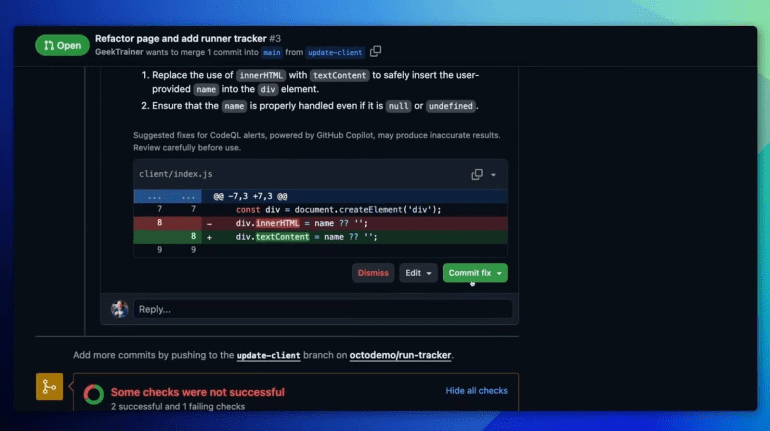- GitHub has launched Autofix Copilot, an AI-powered tool in GitHub Advanced Security.
- The tool identifies and fixes vulnerabilities during pull requests, reducing the need for extensive security expertise.
- Autofix Copilot significantly reduces the time required for vulnerability remediation, enhancing developer productivity.
- Users reported a dramatic decrease in the time needed to resolve issues, with some fixes happening three times faster.
- The tool provides fixes and educates developers on the importance and implementation of these solutions.
- Powered by CodeQL and OpenAI’s GPT-4, Autofix Copilot integrates with both private and open-source codebases.
Main AI News:
In a landscape where speed often trumps caution, Microsoft Corp.’s GitHub has unveiled a transformative tool that balances rapid development with robust security. The newly released Autofix Copilot, an AI-powered vulnerability remediation solution within GitHub Advanced Security, is designed to preemptively address software issues, preventing them from escalating into more significant problems.
Following its public beta debut in March, Autofix Copilot leverages advanced generative AI to identify and remediate vulnerabilities during pull requests. It offers developers precise solutions before code is pushed into production. This innovative approach significantly reduces the dependency on specialized security expertise and the time typically required to fix vulnerabilities.
“Code scanning tools detect vulnerabilities, but they don’t address the fundamental problem: remediation takes security expertise and time, two valuable resources in critically short supply,” explained Mike Hanley, chief security officer and senior vice president of engineering at GitHub. “In other words, finding vulnerabilities isn’t the problem. Fixing them is.”
Mirroring the functionality of GitHub’s AI-driven Copilot, which aids in rapid software development, Autofix Copilot acts as a virtual security consultant. It scans code for vulnerabilities, explains why specific code is problematic and provides actionable fixes to address these issues effectively.
During the beta testing phase from May to July, users experienced marked improvements in both the speed and efficiency of issue resolution. GitHub reported that the median time to commit a fix from pull-request alerts automatically dropped to just 28 minutes with Autofix Copilot, compared to 1.5 hours when done manually.
Vulnerabilities such as cross-site scripting saw even more significant reductions in remediation time. Fixes that would typically take 2.8 hours manually were accomplished in just 22 minutes using Copilot, while SQL injection issues were resolved in 18 minutes compared to 3.7 hours without AI assistance.
The power of Autofix Copilot lies not only in its ability to suggest fixes but also in its capacity to educate developers on the importance of these solutions, even if they need deep security expertise. This dual function enhances developers’ overall security acumen, contributing to more robust and reliable codebases.
Underpinned by CodeQL, a specialized code scanning engine, and OpenAI’s GPT-4 model, Autofix Copilot is designed to integrate seamlessly with private enterprise codebases and open-source projects. As a critical player in the global open-source community, GitHub is uniquely equipped to enhance the safety and reliability of open-source software through tools like Autofix Copilot, ultimately contributing to a more secure digital ecosystem.
Conclusion:
The introduction of Autofix Copilot by GitHub represents a significant advancement in the software development market. By combining AI with security-focused automation, GitHub addresses a critical pain point—vulnerability remediation—while enhancing developer productivity and security awareness. This development will likely set a new standard in the industry, pushing competitors to adopt similar AI-driven approaches. For the broader market, this could lead to faster, more secure software releases, reducing the risks associated with vulnerabilities and potentially lowering costs related to security breaches. Focusing on private and open-source codebases ensures widespread adoption, solidifying GitHub’s position as a leader in developer tools.

